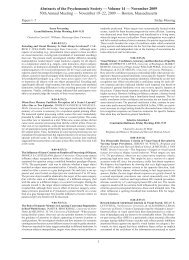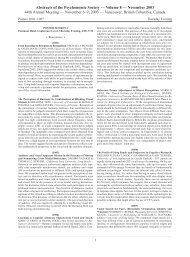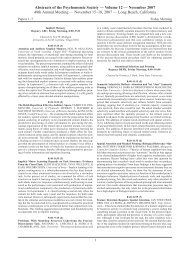Abstracts 2005 - The Psychonomic Society
Abstracts 2005 - The Psychonomic Society
Abstracts 2005 - The Psychonomic Society
You also want an ePaper? Increase the reach of your titles
YUMPU automatically turns print PDFs into web optimized ePapers that Google loves.
Papers 69–76 Friday Afternoon<br />
SYMPOSIUM: <strong>The</strong> Effect of Emotion on Declarative Memory<br />
Grand Ballroom Centre, Friday Afternoon, 1:30–3:25<br />
Chaired by Morris Moscovitch, University of Toronto<br />
1:30–1:45 (69)<br />
<strong>The</strong> Effect of Emotion on Declarative Memory. MORRIS MOSCO-<br />
VITCH, ADAM K. ANDERSON, & DEBORAH TALMI, University<br />
of Toronto—In this symposium, speakers attempt to integrate the exciting<br />
work on the cognitive mechanisms and the neural substrate underlying<br />
the effect of emotion on declarative memory. Going beyond<br />
the fundamental claim that memory for emotional events is better than<br />
memory for neutral events, speakers discuss the phenomenological,<br />
cognitive, and neurobiological uniqueness of emotional memories.<br />
Cahill discusses the effect of sex differences and hemisphere laterality<br />
on the modulatory effects of emotion on memory consolidation.<br />
Kensinger discusses the effects of emotional content on the likelihood<br />
that individuals will remember particular details associated with an<br />
event. LaBar discusses how emotional intensity and valence alter the<br />
perceptual and cognitive properties of autobiographical memories.<br />
Anderson discusses the role that self-referential and meaning-based<br />
encoding processes have in the enhanced retention of emotional memories.<br />
Speakers draw on and integrate data from behavioral, neuroimaging,<br />
and animal research.<br />
1:45–2:10 (70)<br />
Sex and Hemisphere Influences on Emotional Memory. LARRY<br />
CAHILL, University of California, Irvine—Extensive evidence from<br />
animal and human subject work supports the view that endogenous<br />
stress hormones and the amygdala interact to modulate memory storage<br />
processes for emotionally arousing events. In recent years, increasing<br />
evidence has documented influences of both subject sex and<br />
cerebral hemisphere on brain mechanisms of emotional memory.<br />
<strong>The</strong>se influences will be the focus of this presentation.<br />
2:10–2:35 (71)<br />
<strong>The</strong> Effects of Emotion on Memory Specificity. ELIZABETH<br />
KENSINGER, Boston College and Martinos Center for Biomedical<br />
Imaging—Emotion infuses many of life’s experiences. Numerous<br />
studies have demonstrated that the likelihood of remembering a particular<br />
experience can be affected by its emotional content, with emotional<br />
experiences more often remembered than neutral ones. In this<br />
talk, I will present recent evidence indicating that the emotional content<br />
of information also can increase the likelihood that individuals remember<br />
particular details associated with an event (e.g., whether an<br />
item was imagined or remembered; the specific visual details of a presented<br />
item). I also will discuss neuroimaging evidence suggesting<br />
that the engagement of limbic regions (particularly the amygdala and<br />
orbitofrontal cortex) during encoding and retrieval mediates these effects<br />
of emotional content on memory specificity.<br />
2:35–3:00 (72)<br />
<strong>The</strong> Phenomenological Experience of Emotional Remembering.<br />
KEVIN LABAR, Duke University—Psychologists tend to define the<br />
memory-enhancing effect of emotion as the likelihood that an emotional<br />
event will be retrieved, relative to a neutral one. However, emotion<br />
influences not just the accessibility of memory traces but also<br />
subjective aspects of remembering. Behavioral data will be presented<br />
that considers how emotional intensity and valence alter the cognitive<br />
properties of autobiographical memories. Neuroimaging studies will<br />
be reviewed that identify components of the autobiographical memory<br />
network that are sensitive to variations in emotional intensity and<br />
the sense of reliving during recall. Finally, the role of the medial temporal<br />
lobe in the successful retrieval of remote emotional memories<br />
will be discussed, with an emphasis on dissociating structures that<br />
mediate recollection versus familiarity. This research characterizes<br />
the broad influence of emotional intensity on memory and reveals<br />
synergistic actions of the amygdala, hippocampus, and inferior pre-<br />
12<br />
frontal cortex that underlie the phenomenological experience of emotional<br />
remembering.<br />
3:00–3:25 (73)<br />
Psychological and Neural Accounts of Emotional Enhancement of<br />
Episodic Memory. ADAM K. ANDERSON, University of Toronto—<br />
Emotional events are often highly personally relevant and may be associated<br />
with self-referential and meaning-based deep processing, resulting<br />
in their enhanced retention and phenomenological salience.<br />
Neurobiological approaches, however, suggest that such emotional<br />
enhancement critically depends upon enhanced memory consolidation<br />
mediated by the amygdala—an evolutionarily older neural structure<br />
not associated with higher order psychological processes. Neural<br />
accounts suggest that the greater psychological salience of emotional<br />
memories may simply reduce to the prerequisite of greater amygdala<br />
recruitment. Data will be presented in only partial support of this notion,<br />
showing that amygdala recruitment is necessary but insufficient<br />
to account for enhanced remembrance of emotional events.<br />
Task Switching<br />
Grand Ballroom East, Friday Afternoon, 1:30–3:50<br />
Chaired by Erik M. Altmann, Michigan State University<br />
1:30–1:45 (74)<br />
Switch Cost Confusion: Validity Problems in Task-Switching Research.<br />
ERIK M. ALTMANN, Michigan State University—A central<br />
construct in the study of cognitive control is switch cost, the effect on<br />
performance of switching, as opposed to repeating a task between trials.<br />
However, a little-discussed fact is that the most common paradigms<br />
for measuring switch cost, explicit cuing and alternating runs,<br />
measure it differently. Whereas explicit cuing compares trials after a<br />
switch cue with trials after a repeat cue, alternating runs compares the<br />
first trial of a run (also a switch trial) with the second trial of a run<br />
(also a repeat trial), which is a significant confounding, because both<br />
the position and the switching variables independently affect performance.<br />
Widespread discussion of these two switch cost measures as<br />
identical has likely contributed to the heterogeneity of the data on<br />
switch cost, and the confounded nature of the alternating-runs version<br />
suggests that even dramatic findings from that paradigm add little diagnostic<br />
value to theoretical debates over models of cognitive control.<br />
1:50–2:05 (75)<br />
Decomposing Interference and Adaptation Costs in Task Switching.<br />
DANIEL GOPHER, VERED YEHENE, & OLGA CHUNTONAV,<br />
Technion–Israel Institute of Techology—Experiments were conducted<br />
to evaluate the relative contribution, to the costs of task switching, of<br />
adaptation and reconfiguration efforts, as compared with interference<br />
and inhibition factors. <strong>The</strong>oretical accounts for performance costs in<br />
task switching vary in their emphasis on the influence of the two types<br />
of costs. We combined task switching with the task flankers paradigm,<br />
in an attempt to distinguish between these determinants of switching<br />
costs. Flankers on the sides of the imperative stimulus at each trial are<br />
distractors that need to be actively blocked. Results show that in task<br />
switching, flankers in one task become effective distractors in another<br />
task only when tasks are practiced in alternation, but not in uniform<br />
blocks. In task-switching blocks, their effects are comparable to<br />
flankers of the same task, both in repetition and in switching trials.<br />
<strong>The</strong> results are discussed in the framework of executive control models<br />
and the costs of task switching.<br />
2:10–2:25 (76)<br />
Across-Trial Stimulus Similarity Affects Response Speed, But Not<br />
the Task-Switching Cost. ANDRÉ VANDIERENDONCK, BAPTIST<br />
LIEFOOGHE, & FREDERICK VERBRUGGEN, Ghent University—<br />
<strong>The</strong> possible influence of stimulus-to-task associations on the cost of<br />
switching between two tasks was investigated in a cued task-switching<br />
design. This was studied by means of across-trial distance priming of





